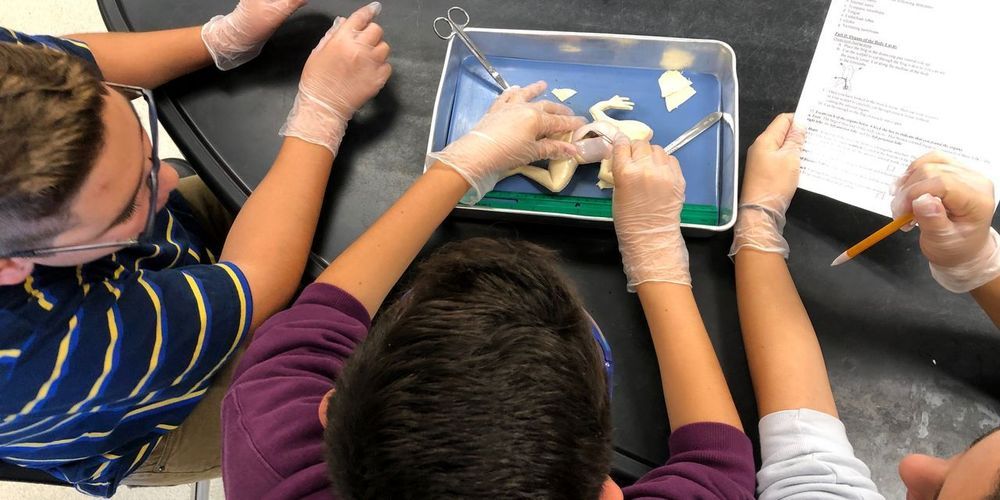Earlier this year, scientists brought dead pig brains back to life, provoking huge ethical quandaries in the process.




Bloom Science and Duke University have entered into an exclusive licensing agreement that provides the biopharmaceutical company access to the intellectual property and technology related to unique strain isolates and genetic variants of Akkermansia genus bacteria.
This type of bacteria has been demonstrated to slow disease progression and prolong survival in animal models of amyotrophic lateral sclerosis (ALS).
Did product safety laws lead to the dumbing down of science toys?
“Users should not take ore samples out of their jars, for they tend to flake and crumble and you would run the risk of having radioactive ore spread out in your laboratory.” Such was the warning that came with the Gilbert U-238 Atomic Energy Lab, a 1950s science kit that included four small jars of actual uranium. Budding young nuclear scientists were encouraged to use the enclosed instruments to measure the samples’ radioactivity, observe radioactive decay, and even go prospecting for radioactive ores. Yes, the Gilbert company definitely intended for kids to try this at home. And so the company’s warning was couched not in terms of health risk but rather as bad scientific practice: Removing the ore from its jar would raise the background radiation, thereby invalidating your experimental results.
The Gilbert U-238 Atomic Energy Lab put a positive spin on radioactivity
The A.C. Gilbert Co., founded in 1909 as the Mysto Manufacturing Co., was already a leader in toys designed to inspire interests in science and engineering. Founder Alfred Carlton Gilbert’s first hit was the Erector Set, which he introduced in 1913. In the early 1920s, the company sold vacuum tubes and radio receivers until Westinghouse Electric cried patent infringement. Beginning in 1922, A.C. Gilbert began selling chemistry sets.
The human microbiome is an important emergent area of cross, multi and transdisciplinary study. The complexity of this topic leads to conflicting narratives and regulatory challenges. It raises questions about the benefits of its commercialisation and drives debates about alternative models for engaging with its publics, patients and other potential beneficiaries. The social sciences and the humanities have begun to explore the microbiome as an object of empirical study and as an opportunity for theoretical innovation. They can play an important role in facilitating the development of research that is socially relevant, that incorporates cultural norms and expectations around microbes and that investigates how social and biological lives intersect. This is a propitious moment to establish lines of collaboration in the study of the microbiome that incorporate the concerns and capabilities of the social sciences and the humanities together with those of the natural sciences and relevant stakeholders outside academia. This paper presents an agenda for the engagement of the social sciences with microbiome research and its implications for public policy and social change. Our methods were informed by existing multidisciplinary science-policy agenda-setting exercises. We recruited 36 academics and stakeholders and asked them to produce a list of important questions about the microbiome that were in need of further social science research. We refined this initial list into an agenda of 32 questions and organised them into eight themes that both complement and extend existing research trajectories. This agenda was further developed through a structured workshop where 21 of our participants refined the agenda and reflected on the challenges and the limitations of the exercise itself. The agenda identifies the need for research that addresses the implications of the human microbiome for human health, public health, public and private sector research and notions of self and identity. It also suggests new lines of research sensitive to the complexity and heterogeneity of human–microbiome relations, and how these intersect with questions of environmental governance, social and spatial inequality and public engagement with science.


Now a group at the center of Putin’s aspirations, the Russian Academy of Sciences, has dropped a bombshell into the plans. A commission set up by the academy has led to the retraction of at least 869 Russian scientific articles, mainly for plagiarism.
At least 869 academic papers have been retracted for flaws that included plagiarism. More could come.


Within the next 10 years, what we eat and how it’s grown will be fundamentally transformed.
And converging exponential technologies—from materials science to AI-driven digital agriculture—are not slowing down. Today’s breakthroughs will soon allow our planet to boost its food production by nearly 70 percent, using a fraction of the real estate and resources, to feed 9 billion by mid-century.
What you consume, how it was grown, and how it will end up in your stomach will all ride the wave of converging exponentials, revolutionizing the most basic of human needs.
[Note: This article is an excerpt from my next book The Future Is Faster Than You Think, co-authored with Steven Kotler, to be released January 28th, 2020.]
Printing Food